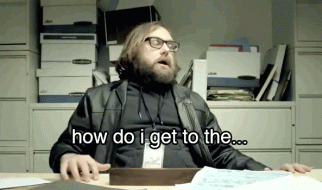Suppose that you have an assignment to research a topic, conduct an expert interview, and write an essay on your findings. One of the most difficult steps in this process is taking the interview transcript and turning it into a story. Whether you conduct an online or in-person interview, it?s likely that your notebook will be full of bullet points and scattered data. The question is: How can I weave this data together to tell the story of my interview?
Here?s the deal:
Many interview narrative essays can follow a simple template. This template helps fit the puzzle pieces together to tell a story in an interesting way. I will share an example of an interview narrative essay that I wrote in high school.And as always, show don?t tell.
 Photo by Aaron Burden on Unsplash
Photo by Aaron Burden on Unsplash
Interview Narrative Essay
Paragraph One:
Hook the reader using an interesting quote
?Someone was trying to die on me in the other room, which is not entirely good,? Dr. Stuart Harris remarks as he settles into a gray, padded chair behind his office desk and resumes our pending Skype call; the collar of his madras shirt slightly askew, and a stethoscope dangling from the front chest pocket of his white physician?s coat. ?I had to keep that from happening, sorry for the quick break,? he apologizes in a baritone voice, ?What can I help you with??
Paragraph Two:
Introduction. Introduce the character and environment using details. Present why the interview is important (don?t explicitly say this though).
From looking at the wooden framed pictures of Himalayan mountains and the Nepalese wilderness on Harris? desk, one might think him out of place. In the midst of the Emergency Department of Massachusetts General Hospital, an often hectic atmosphere replete with sophisticated technology, Dr. Harris directs the department?s Division of Wilderness Medicine and the Wilderness Medicine Fellowship Program. Practicing ?limited medicine in austere conditions,? the division teaches doctors how to provide medical aid in remote environments, far from the ?bells and whistles? of a common hospital. In conjunction, it conducts research on how to best provide critical care for patients in severe environments, such as high altitude. When questioned, ?has wilderness tripping and being immersed in the backcountry had an influence on your life?? he chuckles, ?Well I mean I?m the chief of a division of wilderness medicine at MGH, and that?s something that sure as hell didn?t exist when I came here. I?d say I am a walking billboard for how wilderness tripping can have a marked influence on an individual.?
Paragraph Three:
First evidence paragraph. Disrupt the story flow for a brief second. Let the reader take a breath. Describe your own surroundings. Then, explain the background and expertise of the person.
As tracks from Bob Dylan?s album, Desire, emerge from the kitchen of my house, where my father is preparing dinner, I lean closer to my MacBook. The connection falters and fixes on the image of his office, a small six by eight-foot room with off white colored walls. A bookshelf in the left corner houses wilderness medicine textbooks. When the video unfreezes, Harris? face, his thick brown beard, touched with gray, focuses and his wire-framed glasses propped on the frame of his nose. A Virginia native, he has grown up with the outdoors as a centerpiece of his identity. In addition to going backcountry camping and mountaineering, Harris was an avid whitewater boater in college and led numerous whitewater trips. While an undergraduate, he spent ninety-five days enrolled in the National Outdoor Leadership School, and eventually became an instructor for the program. He has spent time at Mount Everest, Kilimanjaro, and Denali, and has led trips for the Leadership School in both Wyoming and Alaska. At this period in his life, he spends his summers in the Maine wilderness, near the Allagash River and Mount Katahdin. Doctor Harris concludes, ?Over the years I think I?ve gotten a pretty good, wide experience,? his beard and mustache twitching with each word. While embarking on and leading such an array of wilderness trips, the natural environment has seated itself as a mainstay of both his professional and personal life. In his soft southern drawl Harris confesses, the wilderness ?is where ultimately I frankly feel most comfortable.?
Paragraph Four:
Second evidence paragraph. The next two paragraphs form the apex of the story arc. If the interview produces two main insights, then have two paragraphs. If there is only one main insight, it is fine to only have one paragraph here. Regardless, it is important to use the best, most insightful quotes in order to advance the essay?s So What?. Hint: Use powerful adjectives and verbs to describe the interviewee as they become more passionate about the conversation.
While Dr. Harris leans forward in his chair, taking up a greater portion of the eight by eleven screen of my computer, he discusses the tremendous benefits wilderness tripping can have on people, especially teenagers. He explains, ?from the individual to the social dynamic between groups, it?s fascinating to see how people, especially when they?re pushed a little bit beyond their comfort levels, can be groomed for tremendous growth.? Through an individual lens, Harris notes maturation, learning, strengthening of self-confidence, and physical growth as some beneficial influences of being immersed in nature. Additionally, he attests that for teenagers especially, ?getting outside is a counterbalance to everything else going on one?s life, in the world. It allows room for independent intellectual exercise, it allows space for one to be separate from social pressures, and it can be tremendously affirming.? With the enunciation of each word, Harris? engagement and introspection heighten. It becomes evident that he is not simply relaying information from the wilderness textbooks from his bookshelf. Rather, each benefit has been genuinely derived from his personal experience as a wilderness tripper. Zooming out from an individual lens, Doctor Harris expresses an irony he has observed from social settings. Although two students may attend a class every day together for numerous years, there is a definite possibility that they may know practically nothing about one another. However, when immersed in the wilderness with some perceived or real danger for even a brief period of time, those same two students may come to understand one another far better than they had before. In response to the manifested paradox, Harris reflects, ?You just learn to trust people in a way that there are not many occasions in our daily lives where there?s any clear correlate to that.? Furthermore, in a Mark Twain-esque manner, Doctor Harris expresses that when removed from the silliness we indulge on a daily basis in ?quote-unquote civilized circumstances, one can break through some of the silly artificiality that we allow during our daily lives.? Because many trivial social constructs are rendered useless, being in the intimacy of the backcountry allows one to disregard many social labels, such as who is ?popular? or not or who is ?stylish? or not. As a result, wilderness tripping can allow individuals to foster relationships among members of different social groups or cliques.
Paragraph Five:
Third evidence paragraph. Use another hard-hitting piece of evidence and give it contextual descriptions, such as how the interviewee looks or sounds. Advance the main message, and prepare for the essay to close.
As Dylan?s renowned 1976 hit, Hurricane, begins to play from the other room, Doctor Harris inhales slowly and leans back in his chair. His weathered face conjures up images in my mind of other bearded philosophers of the natural world, such as John Muir or Henry David Thoreau. In addition to facial hair, my interviewee?s thoughts bear a striking resemblance to those of the sentiments of such thinkers. Inspired by the connection, I bring up a quote from Thoreau?s memoir Walden: ?I went to the woods because I wished to live deliberately, to front only the essential facts of life, and see if I could not learn what it had to teach, and not, when I came to die, discover that I had not lived.? After being questioned, ?What do you believe the wilderness has to teach us?? Doctor Harris succinctly responds, ?It?s who we are.? Rephrased, this elegantly simple yet profound notion presents the relationship that nature and humans are not two separate entities, but, rather humans are nature. While many other sub lessons can be learned from the wilderness, Harris affirms that the overarching teaching of nature, while maybe obvious, is simply that humans and nature are not separate, but are one. He elucidates:
There is the idea that we go to the wilderness to see something different. The more I?ve thought about it, it?s just kind of ridiculous. The wilderness is who we are, and that?s where we evolved, and we are as much animal as a bobcat or any other animal, and how we maintain our homeostasis, our heart rate, our blood pressure, and everything. We?re all part of the same natural systems and we?re dependent on the same processes as all the other creatures are. We don?t think about that. So I think when we go outside into wilderness areas, I think we?re returning, and not in some tree-hugging way, to our roots.
In expressing this idea, Doctor Harris? energy and intensity peak. His eyes open wider than before. His southern drawl becomes more pronounced, emphasizing vowels in words like ?are? or ?ridiculous.? Such a level of engagement has been reached in order to convey a quite simple principle. As he raises his eyebrows and gestures with his hands, Harris continues, ?frankly all of the rest of the stuff that we?re doing in the front country, as we say, as opposed to the backcountry, is the artificial things.? Again, he introduces a simple notion, which lends itself to a profound understanding. Maintaining a parallel to the ideologies of Thoreau, here, Doctor Harris affirms that nature truly holds ?the essential facts of life,? while human civilizations, or the front country, are arbitrarily convoluted with contrived constructs, systems, and orders. He concludes, ?So in that regard, yes it’s very true that getting outside gives us a way, a chance to front some of the questions that Thoreau posed, Muir posed, and a bunch of other people have postulated, that there?s something just central to our identities and our beings to experience by being outside.?
Paragraph Six:
The concluding paragraph. Like a triangle, begin at the top of the paragraph with a narrow-focused summary of the interviewee?s main message. Then, continuing the triangle analogy, expand outwards and downwards from that point. Deliver the broader context for why the interview matters. To end the essay, quote how the interviewee said goodbye. Close on a friendly note. Hint: If you can, try to reference something that you said in the introduction to produce a ?full-circle? effect in your essay.
A common theme, Harris notes, is identity. Whether one identifies as a wilderness tripper or not, as a whole, the human race is unequivocally bound to its fundamental connection with nature. No matter how far we stray from our roots and try to conceal its presence in our psyche, the wilderness will always remain in contact with us. Furthermore, Harris notes the ties between the American identity and the great outdoors through the historical doctrine ?manifest destiny? and our nation?s movement West through the territories. While centuries of innovation and infrastructural change have altered our country, the historical significance of the wilderness has not been forgotten. It?s clear, that wilderness is not only vital to our identity as humans but is essential to our identity as Americans. On that conclusive thought, the sounds of my parents serving dishes emanate from the adjoining dining room, and our Skype call nears an end. Tranquil and amiable, Doctor Harris says, ?take care my friend.? With that, I put my computer to sleep, the image of a stethoscope dangling from the pocket of his white doctor?s coat fades to black.
Thank you to Dr. Stuart Harris for taking the time to speak with me. To learn more about Harris and his work in wilderness medicine, check out a piece written in Harvard Magazine.
![How to Write an Interview Narrative Essay [Template and Example]](https://911weknow.com/wp-content/uploads/2020/09/how-to-write-an-interview-narrative-essay-template-and-example-628x275.jpeg)

